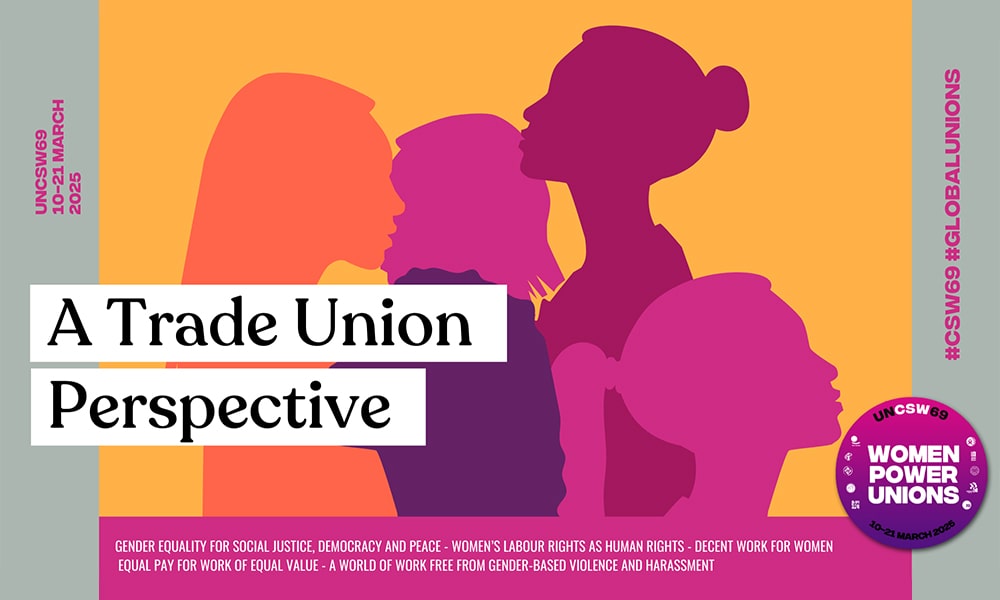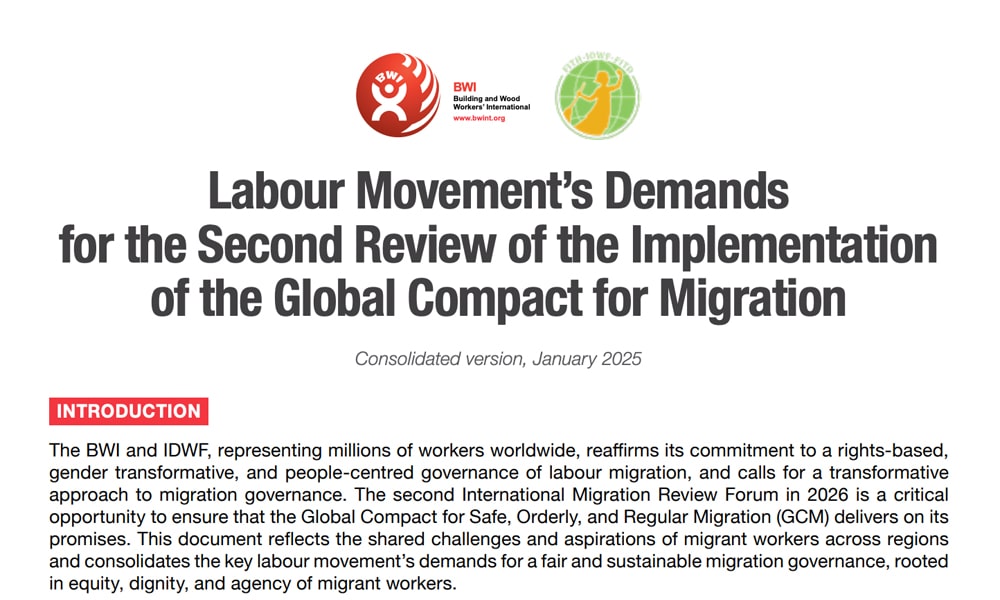
On International Women’s Day, the IDWF celebrates the women who care for the world: Domestic Workers. Under the theme “Invest in Care: Accelerate Social Justice for Domestic Workers,” this March 8th, we will redouble efforts to put the priorities of domestic workers as paid and unpaid caregivers on public agendas. We also have the unique opportunity to make our demands visible and influence global policies on care at CSW68. Alongside global unions, partners, and allies, our leaders are ready to amplify the voices of domestic workers and make a mark at the UN headquarters in New York. This year, we have strong reasons to celebrate Women’s Day. Cheers to domestic workers worldwide!
There are 75.6 million paid domestic workers worldwide who fulfill the care needs of the global population, either through direct care activities -such as caring for children, the elderly, and people with illnesses or disabilities- or through indirect care activities – such as cooking and cleaning. However, domestic workers continue to be undervalued and unrecognized as workers; the conception that domestic work is an activity that requires no skill and naturally falls to women still persists. But anyone who has provided or received care during their life knows that it is an essential task for the well-being and sustenance of families, societies, and economies. Domestic work is the work that makes all other work possible.
The care economy is still deeply marked by several forms of discrimination, exclusion, violence, and intersectional systems of oppression based on gender, class, ethnicity, race, migratory status, age, and disability, among other factors. Historically, care work has been assigned to impoverished, marginalized, and racialized women. Within the care workforce, domestic workers face the worst working and living conditions, with extremely low wages, high levels of informality, lack of legal protection or effective implementation of existing norms, limited access to social protection, and a disproportionate exposure to occupational risks, violence, and harassment in the workplace. The situation of migrant, indigenous, and black workers, who are overrepresented in the sector, is even more precarious.
Moreover, the multitude of injustices that domestic workers endure in the workplace is compounded by the burden of unpaid care work that falls on their shoulders due to the lack of access to public care provision services and social security benefits. Unpaid care provision is also work and affects the access and permanence of domestic workers in the labor market, as well as the quality of their jobs. It is crucial to recognize that care workers have, in addition to labor rights as workers, long-term care needs for their children, elderly relatives, and themselves as they age.
The coronavirus pandemic has brought to light a paradox that should serve as a learning experience: it has exposed how much societies depend on the essential services of the care economy, the unsustainability and inefficiency of care systems, and, at the same time, how little valued and recognized care workers are, who were among the most impacted by the Covid-19 crisis. Likewise, the world faces a climate crisis that is destroying livelihoods and communities, and that strongly impacts domestic workers, increasing their care burden, limiting their access to basic resources, pushing them to migrate due to natural disasters, and worsening their quality of life. A transition to a sustainable economy that places care and domestic workers at the center can create millions of green and high-quality care jobs, contributing to building more just and resilient societies.
According to ILO report “Care work and care jobs for the future of decent work ”, 2.1 billion people were in need of care in 2015 and warned of a “care crisis” if not adequately addressed. The pandemic accelerated this crisis, deepening pre-existing gender inequalities and norms, and putting unprecedented stress on our already overburdened care systems. By 2030, the number of people in need of care is expected to increase to 2.3 billion as a result of population growth, aging societies, changes in family structures, greater participation of women in the labor market, and existing deficiencies in social policies. If not properly tackled, the current deficits in the provision of care services and their quality will lead to an irreversible crisis and further contribute to the precariousness of employment in the care sector.
To achieve the Sustainable Development Goals (SDGs) and meet the targets set in the ILO’s Decent Work Agenda, investment in the care economy needs to be doubled by 2030, which has the potential to generate a total of 475 million jobs. But it is not enough to allocate financial resources; transformative policies are needed to develop comprehensive care systems that are inclusive, gender-sensitive, and have an intersectional, intercultural, and human rights approach. Public policies on care are transformative when they guarantee the rights, autonomy, and well-being of paid care workers, unpaid caregivers, and care recipients. To achieve this, they must be based on ILO’s 5 Rs Framework for decent care work: Recognize, Reduce, and Redistribute unpaid care work; Reward paid care work, promoting more work and decent work for workers, and ensure Representation, social dialogue, and collective bargaining for care workers.
The IDWF and domestic workers organizations worldwide have a long history of struggling for the labor and human rights of domestic workers, having achieved meaningful progress at the global, regional, and national levels in terms of legal protection and favorable public policies for our sector. The representation and active participation of our movement in decision-making spaces, framework development, and the building of a global agenda on the care economy are crucial for ensuring decent care work. For us, social dialogue – based on respect for freedom of association and the effective recognition of the right to collective bargaining – is essential in translating economic development into social justice. Nothing for us without us!
The global crises that have been shaking the planet in recent years (Covid-19, environmental degradation, armed conflicts, the rise of authoritarian regimes, and economic debacles) have highlighted the unjust social organization of care and the need to move towards a change in the development model that places care and life sustainability at the center. But they also represent an opportunity to capitalize on the lessons learned and move towards transformative recovery.
Care is a human right and a public good. And domestic workers are key actors in the construction of care societies based on social, economic, and climate justice, gender equity, and respect for the labor and human rights of all people. They constitute a dynamic and welfare-multiplying workforce. It is time to recognize the economic and social value of care work through policies that place the rights of domestic workers at the center. If we truly aspire to a fairer and more equal world, let’s start by caring for the women who care for the world!







